从句与非谓语之间的转换
- 格式:doc
- 大小:36.00 KB
- 文档页数:2
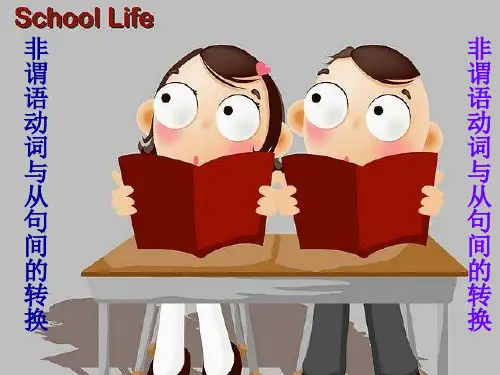
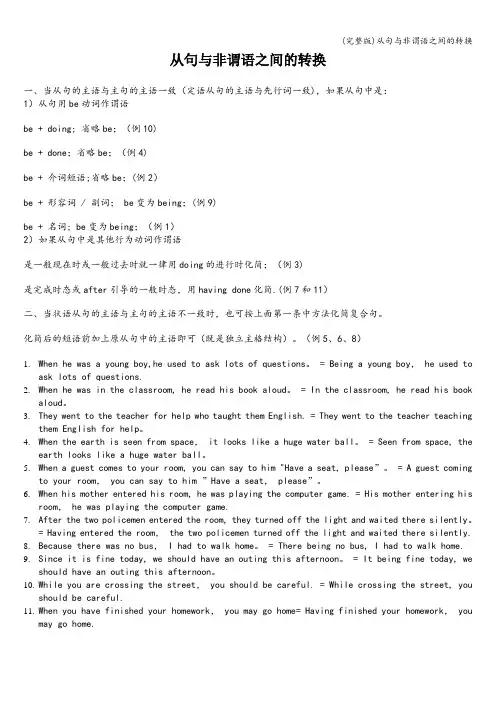
从句与非谓语之间的转换一、当从句的主语与主句的主语一致(定语从句的主语与先行词一致),如果从句中是:1)从句用be动词作谓语be + doing; 省略be;(例10)be + done;省略be;(例4)be + 介词短语;省略be;(例2)be + 形容词 / 副词; be变为being;(例9)be + 名词; be变为being;(例1)2)如果从句中是其他行为动词作谓语是一般现在时或一般过去时就一律用doing的进行时化简;(例3)是完成时态或after引导的一般时态,用having done化简.(例7和11)二、当状语从句的主语与主句的主语不一致时,也可按上面第一条中方法化简复合句。
化简后的短语前加上原从句中的主语即可(既是独立主格结构)。
(例5、6、8)1.When he was a young boy,he used to ask lots of questions。
= Being a young boy, he used toask lots of questions.2.When he was in the classroom, he read his book aloud。
= In the classroom, he read his bookaloud。
3.They went to the teacher for help who taught them English. = They went to the teacher teachingthem English for help。
4.When the earth is seen from space, it looks like a huge water ball。
= Seen from space, theearth looks like a huge water ball。
5.When a guest comes to your room, you can say to him "H ave a seat, please”。

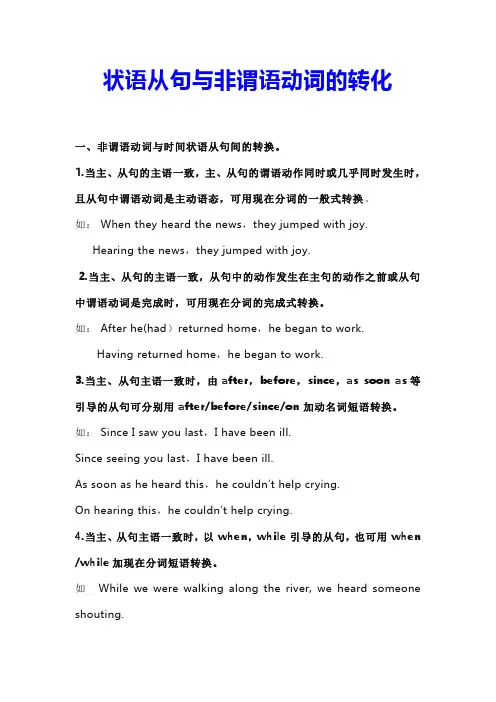
状语从句与非谓语动词的转化一、非谓语动词与时间状语从句间的转换。
1.当主、从句的主语一致,主、从句的谓语动作同时或几乎同时发生时,且从句中谓语动词是主动语态,可用现在分词的一般式转换。
如: When they heard the news,they jumped with joy.Hearing the news,they jumped with joy.2.当主、从句的主语一致,从句中的动作发生在主句的动作之前或从句中谓语动词是完成时,可用现在分词的完成式转换。
如: After he(had)returned home,he began to work.Having returned home,he began to work.3.当主、从句主语一致时,由after,before,since,as soon as等引导的从句可分别用after/before/since/on加动名词短语转换。
如: Since I saw you last,I have been ill.Since seeing you last,I have been ill.As soon as he heard this,he couldn’t help crying.On hearing this,he couldn’t help crying.4.当主、从句主语一致时,以when,while引导的从句,也可用when /while加现在分词短语转换。
如While we were walking along the river, we heard someone shouting.While walking along the river,we heard some one shouting.5.当主、从句的主语一致,且从句的谓语动词是被动语态时,可用过去分词短语转换。
如:After they were sent to the zoo, the monkeys had good health. Sent to the zoo, the monkeys had good health.6.当主、从句的主语不一致时,时间状语从句可转换成分词的独立主格结构,即名词/主格代词+分词。
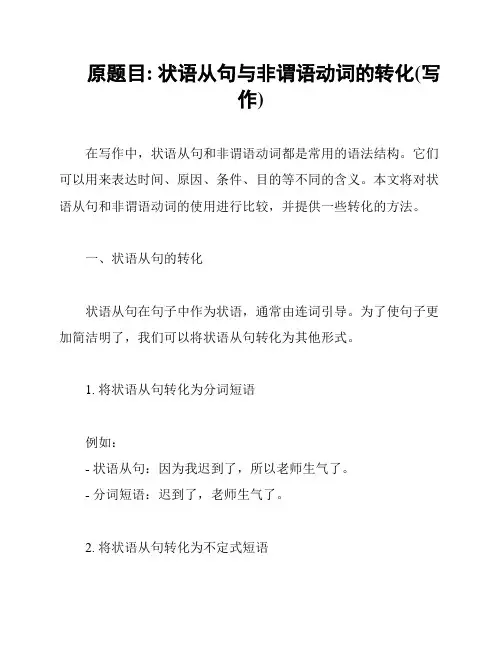
原题目: 状语从句与非谓语动词的转化(写作)在写作中,状语从句和非谓语动词都是常用的语法结构。
它们可以用来表达时间、原因、条件、目的等不同的含义。
本文将对状语从句和非谓语动词的使用进行比较,并提供一些转化的方法。
一、状语从句的转化状语从句在句子中作为状语,通常由连词引导。
为了使句子更加简洁明了,我们可以将状语从句转化为其他形式。
1. 将状语从句转化为分词短语例如:- 状语从句:因为我迟到了,所以老师生气了。
- 分词短语:迟到了,老师生气了。
2. 将状语从句转化为不定式短语例如:- 状语从句:虽然天气很冷,但他还是出去了跑步。
- 不定式短语:天气很冷,他还是出去了跑步。
3. 将状语从句转化为介词短语例如:- 状语从句:当他听到好消息时,他高兴得跳了起来。
- 介词短语:听到好消息时,他高兴得跳了起来。
二、非谓语动词的转化非谓语动词是动词的一种形式,可以作主语、宾语、定语或状语。
在写作中,我们可以将非谓语动词转化为其他形式,以减少句子的复杂性。
1. 将非谓语动词转化为动词-ing形式例如:- 非谓语动词:我喜欢读书。
- 动词-ing形式:我喜欢阅读。
2. 将非谓语动词转化为动词不定式例如:- 非谓语动词:他跟我一起完成了任务。
- 动词不定式:他和我一起完成任务。
3. 将非谓语动词转化为名词例如:- 非谓语动词:她喜欢游泳。
- 名词:她喜欢游泳。
总结:通过将状语从句和非谓语动词进行转化,可以使句子更加简洁明了。
在实际写作中,我们可以根据需要选择合适的转化形式。
然而,需要注意的是,转化时要注意保持句子的逻辑完整性和语法准确性。
以上是关于状语从句与非谓语动词的转化的简介,希望能对您有所帮助。
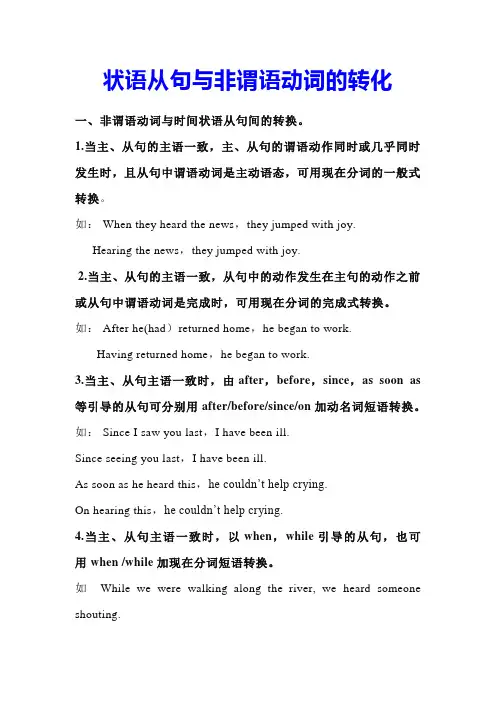
状语从句与非谓语动词的转化一、非谓语动词与时间状语从句间的转换。
1.当主、从句的主语一致,主、从句的谓语动作同时或几乎同时发生时,且从句中谓语动词是主动语态,可用现在分词的一般式转换。
如: When they heard the news,they jumped with joy.Hearing the news,they jumped with joy.2.当主、从句的主语一致,从句中的动作发生在主句的动作之前或从句中谓语动词是完成时,可用现在分词的完成式转换。
如: After he(had)returned home,he began to work.Having returned home,he began to work.3.当主、从句主语一致时,由after,before,since,as soon as 等引导的从句可分别用after/before/since/on加动名词短语转换。
如: Since I saw you last,I have been ill.Since seeing you last,I have been ill.As soon as he heard this,he couldn’t help crying.On hearing this,he couldn’t help crying.4.当主、从句主语一致时,以when,while引导的从句,也可用when /while加现在分词短语转换。
如While we were walking along the river, we heard someone shouting.While walking along the river,we heard some one shouting. 5.当主、从句的主语一致,且从句的谓语动词是被动语态时,可用过去分词短语转换。
如:After they were sent to the zoo, the monkeys had good health.Sent to the zoo, the monkeys had good health.6.当主、从句的主语不一致时,时间状语从句可转换成分词的独立主格结构,即名词/主格代词+分词。
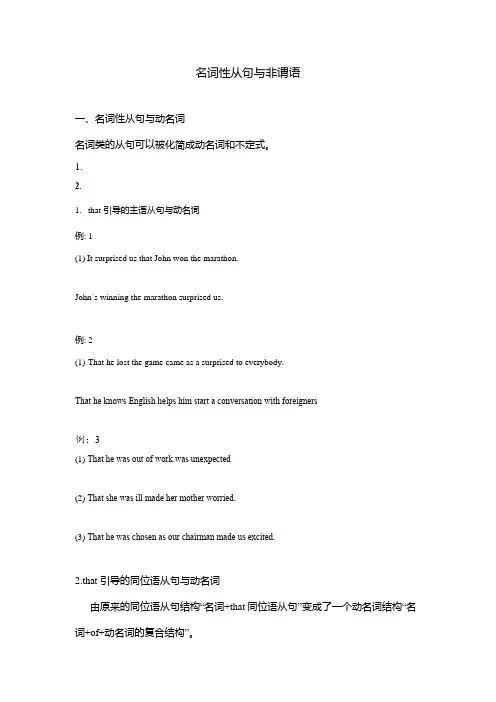
名词性从句与非谓语一、名词性从句与动名词名词类的从句可以被化简成动名词和不定式。
1.2.1.that引导的主语从句与动名词例: 1(1) It surprised us that John won the marathon.John`s winning the marathon surprised us.例: 2(1)That he lost the game came as a surprised to everybody.That he knows English helps him start a conversation with foreigners例:3(1)That he was out of work was unexpected(2)That she was ill made her mother worried.(3)That he was chosen as our chairman made us excited.2.that引导的同位语从句与动名词由原来的同位语从句结构“名词+that同位语从句”变成了一个动名词结构“名词+of+动名词的复合结构”。
例: 1(1)There was no chance that Davy would come from the battle alive.(2)There was no chance of Davy coming from the battle alive.例:2(1)We were greatly encouraged by the news that china had launched another man-made satellite.(2)It is said that the book has been translated into many other languages.The book is said to have been translated into many other languages(3)It was reported that the bank in the local has been robbed in broad daylight yesterday(4)it is thought that he is the greatest person in the world.(5)It is arranged that the class meeting will be held next week.3.that引导的宾语从句与动名词由that引导的宾语从句的简化较为复杂,因为它可以转换成动名词,也可以转换成不定式,这主要与主句谓语动词的用法密切相关。
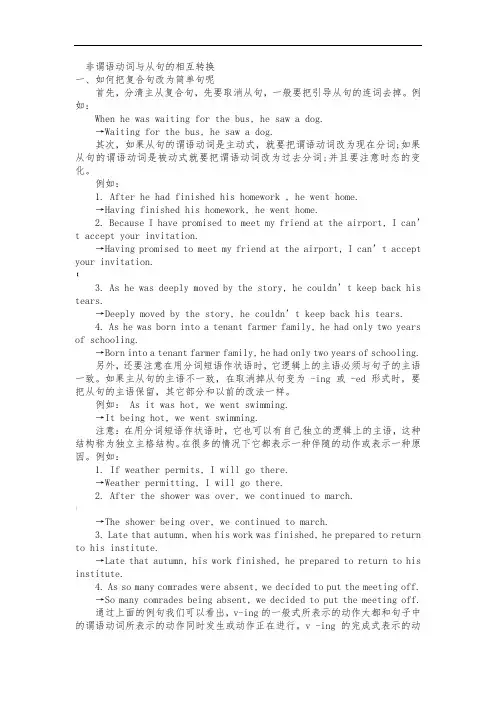
非谓语动词与从句的相互转换一、如何把复合句改为简单句呢首先,分清主从复合句,先要取消从句,一般要把引导从句的连词去掉。
例如:When he was waiting for the bus, he saw a dog.→Waiting for the bus, he saw a dog.其次,如果从句的谓语动词是主动式,就要把谓语动词改为现在分词;如果从句的谓语动词是被动式就要把谓语动词改为过去分词;并且要注意时态的变化。
例如:1. After he had finished his homework , he went home.→Having finished his homework, he went home.2. Because I have promised to meet my friend at the airport, I can’t accept your invitation.→Having promised to meet my friend at the airport, I can’t accept your invitation.【3. As he was deeply moved by the story, he couldn’t keep back his tears.→Deeply moved by the story, he couldn’t keep back his tears.4. As he was born into a tenant farmer family, he had only two years of schooling.→Born into a tenant farmer family, he had only two years of schooling.另外,还要注意在用分词短语作状语时,它逻辑上的主语必须与句子的主语一致。
如果主从句的主语不一致,在取消掉从句变为 -ing 或 -ed形式时,要把从句的主语保留,其它部分和以前的改法一样。
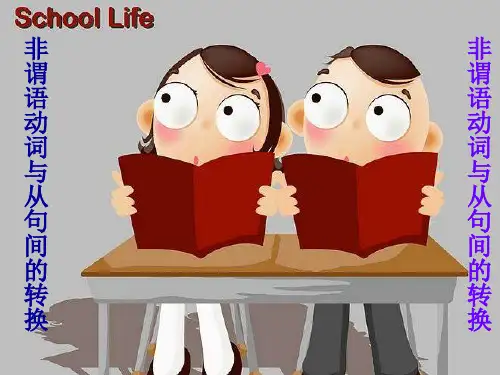

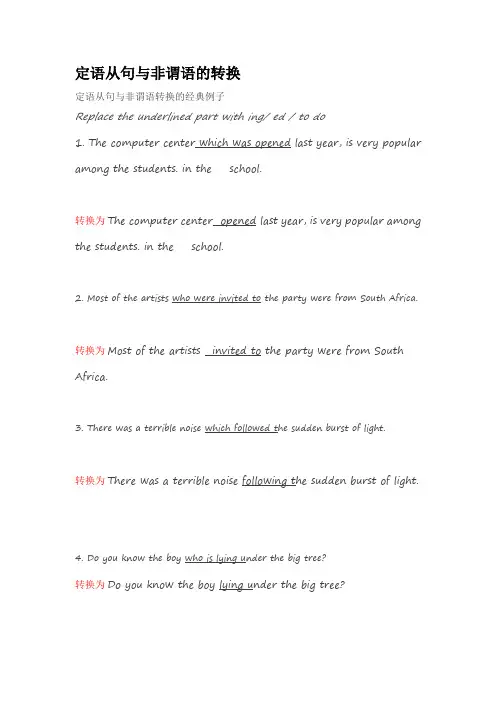
定语从句与非谓语的转换定语从句与非谓语转换的经典例子Replace the underlined part with ing/ ed / to do1. The computer center which was opened last year, is very popular among the students. in the school.转换为The computer center opened last year, is very popular among the students. in the school.2. Most of the artists who were invited to the party were from South Africa.转换为Most of the artists invited to the party were from South Africa.3. There was a terrible noise which followed the sudden burst of light.转换为There was a terrible noise following the sudden burst of light.4. Do you know the boy who is lying under the big tree?转换为Do you know the boy lying under the big tree?5. Are you going to attend the meeting which will be held tomorrow?转换为Are you going to attend the meeting to be held tomorrow?6. I like most of the books which are published in this publishing house.转换为I like most of the books published in this publishing house.7. This is one of the questions which are being discussed at the meeting now. 转换为This is one of the questions being discussed at the meeting now.8. Would you please give me a piece of paper which I can write on ?转换为Would you please give me a piece of paper to write on ?9. The next train which will arrive is from Washington.转换为The next train arriving is from Washington.分词作前置定语•We can see the rising sun.正在升起的太阳•Look at the sleeping baby. So cute.•Watch out that a moving lorry移动的卡车•Don’t eat too many like fried chicken legs•He is a retired worker.退休的工人主动的情况•I know a man who works in that factory.•I know a man working in that factory.•I know a man who is working in that factory.•I know a man working in that factory.•I know a man who worked in that factory.•I know a man working in that factory.••The girl who sits beside me is my cousin.•The girl sitting beside me is (was) my cousin•The girl who is sitting beside me is my cousin.•The girl sitting beside me is (was) my cousin•The girl who sat beside me was my cousin.•The girl sitting beside me is (was) my cousin.结论先行词与现在分词有主动关系,定语从句转换成现在分词短语做后置定语,有主动或进行的意思。
状语从句与非谓语的相互转化1.Since he was defeated, he left the room sadly.2. Once he had been appointed supreme commander, he took the stern measures expected of him. .3. The stranger, after he had discarded his jacket, moved threateningly towards me.4. He wrote his greatest novel while he was working on a freighter.5. Once it was published, the book caused a remarkable stir.6.Since he was persuaded by our optimism, he gladly contributed time and money to the scheme.7. As he is a farmer, he is suspicious of all governmental interference.8. The girl, who was upset by the activities of the ghost, decided to leave.9. The climbers returned, who were hungry and exhausted.10. The children, after they had eaten their fill, were allowed to leave the table.定语从句与非谓语的转化1. The substance, which was discovered almost by accident, has revolutionized medicine.2. The book which is lying on the table is Mary’s.3.The girl who stood in the corner was wearing make-up.4.The dog which was barking next door sounded like a terrier.5.A tile which fell from a roof shattered into fragments at his feet.6.He is talking to a girl who looks like Joan.7.Any coins that may be found on this site must be handed to the police.定语从句与动词不定式转换:1.The next train that arrived was from York.2.The time at which everyone should arrive is 8 pm.3.The place at which you should stay is the Hilton.4.The case which will be investigated tomorrow is connected with the explosion.非限制性定语与非谓语的转换:1.The apple tree, which was swaying gently in the breeze, had a good crop of fruit.2.The substance, which was discovered almost by accident, has revolutionized medicine.3.The man, who was wearing such dark glasses, obviously could not see clearly.4.The cost, which includes meals, is ninety franks.状语从句与非谓语的相互转化的答案1.Defeated, he left the room sadly.2.(Once) appointed supreme commander, he took the stern measures expected of him3.The stranger, having discarded his jacket, moved threateningly towards me.4.He wrote his greatest novel while working on a freighter.5.Once published, the book caused a remarkable stir.6.Persuaded by our optimism, he gladly contributed time and money to the scheme.7.Being a farmer, he is suspicious of all governmental interference.8.The girl, upset by the activities of the ghost, decided to leave.Upset by the activities of the ghost, the girl decided to leave.9.The climbers returned, hungry and exhausted.10.The children, having eaten their fill, were allowed to leave the table.定语从句与非谓语的转化1.The substance, discovered almost by accident, has revolutionized medicine.2.The book lying on the table is Mary’s.3.The girl standing in the corner was wearing make-up.4.The dog barking next door sounded like a terrier.5.A tile falling from a roof shattered into fragments at his feet.6.He is talking to a girl looking like Joan.7.Any coins found on this site must be handed to the police.定语从句与动词不定式转换:1.The next train to arrive was from York.2.The time to arrive is 8 pm.3.The place for you to stay is the Hilton.4.The case to be investigated tomorrow is connected with the explosion.非限制性定语与非谓语的转换:1.The apple tree, swaying gently in the breeze, had a good crop of fruit.2.The substance, discovered almost by accident, has revolutionized medicine.3.The man, wearing such dark glasses, obviously could not see clearly.4.The cost, including meals, is ninety franks.。
状语从句与非谓语作状语的转换将下列非谓语作状语改成状语从句不定式1. 作__________状语:He went to Shanghai to visit his parents.To save the earth, we must prevent the earth from being polluted.I shut the door quietly, so as not to wake the baby.2. 作____________________-状语:He is too naughty to please his teachers.He is old enough to go to school.We came home after our holiday , only to find our garden neat and tidy.3. 作_________状语: 不定式做_______状语时, 一般放在句子末尾。
She burst into laughter to see his funny action.The boy was shocked to see the frightening scene分词1)作_______状语:Hearing the bad news, she burst into tears.Seen from the hill, the park looks more beautiful.Having found a seat, she left her books on it.(2) 作_______状语:Being so poor in those days, they couldn't send the boy to school.Born in a poor family, the boy could not go to school.(3) 作_______状语:Adopting this method, we will raise the average yield by 40 percent.Given more time, we could have done it much better.4) 作_______状语:Admitting what she has said, I still think that she hasn't tried her best.Admitted into the university , he was still upset.(5) 作_______状语:It rained heavily, thus causing severe flooding in that country.It rained for two weeks on end, thus completely ruining our holiday.(6) 作_______状语:The teacher came into the classroom , following a group of students.The teacher came into the classroom, followed by a group of students注意事项:a. 不定式和-ing形式作结果状语时的区别b. 祈使句+and/or+陈述句和To do…, +陈述句的区别______ the corners of the handkerchief to the points of the cross, and you will have a nice strong kite.A. To tieB. TyingC. TiedD. Tie______ the problem _____ me and I ‘ll see what I can do with it.A.When left; forB. Leaving; toC. If you leave; withD. Leave; withc. 句还子是分词:如果句中有连词(and/ but / or ..),要用句子.1) ____ but he still could not understand it.A. Told many timesB. Having been told many timesC. He has been told many timesD. Though he had been told many times2) ____ so he had no difficulty ( in ) understanding English.A. Because he had been in London for 3 yearsB. Having been in London for 3 yearsC. He having been in London for 3 yearsD. He had been in London for 3 yearsd. 要特别注意非谓语的逻辑主语1) Finding her car stolen, _____. (01 上海).A. a policeman was asked to helpB. the area was searching thoroughlyC. it was looked for everywhereD. she hurried to a policeman for help2) While watching television, __________.A.the doorbell rang B.the doorbell ringsC.we heard the doorbell ring D.we heard the doorbell rings高中非谓语动词做状语练习1.____who she was, she said she was Mr.Johnson’s friend.A. AskingB. AskedC. To be askedD. When asking2.He hurried to the station,___the 9:30 train had already left.A. findingB. foundC. only to findD. only finding3. The dog, _____, will be made a good watchdog.A. to train properlyB. being trained properlyC. properly to trainD. trained properly4. _____ the diamond, he had to look for a place to hide it.A. Having stolenB. Having been stolenC. StolenD. Stealing5. _____ the front door _____, he had to enter the room through the back door.A. Seen; paintedB. Seeing; paintedC. Being seen; being paintedD. Seeing; being painted6. And there, almost _____ in the big chair, sat her little brother, who never had to be told to keep quiet.A. having lostB. losingC. to be lostD. lost7.___all my letters, I had a drink and went out.A.FinishedB.Having finishedC.FinishingD.To finish8.From the dates___on the gold coin, it is conformed that it was made five hundred years ago.A. markingB. markedC. to be markedD. having been marked9. The old farmer, _____ the badly injured and burnt soldier, came out of the burning farmhouse, calling continuously for help.A. supportingB. having supportedC. being supported byD. being supported10. In January , 2004, the United States succes sfully launched “Spirit”, a Mars Exploration Rover, _____ a new milestone in the history of mankind.A. it markedB. markingC. markedD. to mark11.____time and labour, cartoonists generally draw the hands of their characters with only 3 fingers and a thumb.A. To saveB. SavedC. SavingD. Having saved12.And there, almost___in the big chair, sat her little brother, who never had to be told to keep quiet.A.having lostB.losingC.to be lostD.lost13.The policeman put down the phone, ___with a smile on his face.A.satisfiedB.satisfyingC.to be satisfiedD.having satisfied14.___, your composition is full of mistakes.A.Writing carelesslyB.Written carelesslyC.Having written carelesslyD.Being written carelessly15.She made a candle___us light.A.giveB.gaveC.to giveD.given16.__several times, the young scientist still kept on making his experiments.A.Having been failedB.Having failedC.Though failedD.Because of failure17. The sun was shining brightly, _____ everything there _____ more beautiful.A. making; lookB. to make; lookedC. and made; lookingD. and making; be looked18. New ideas sometimes have to wait for years before _____.A. being fully acceptingB. fully acceptingC. having fully acceptedD. fully accepted19. _____ full preparations, we decided to put off the meeting till next week.A. We did not makeB. Having not madeC. We had not madeD. Not having made20. Towards evening, the patient opened his mouth as if _____ something to his son.A. saidB. say c.to say D. to have said21. --- Would you be _____ lend me your bicycle? --- Sure.A. so kind as toB. kind enough as toC. very kind toD. so kind to22. Some of the schools in Shanghai have moved one step closer to _____ with the global education community.A. being connectedB. connectC. having connectedD. be connected23. _____ the big snake, the little girl stood under the tree _____ to death.A. Seeing; frightenedB. Seeing; frighteningC. Seen; frightenD. To see; frightening24. _____ and out of breath, we reached the top of the mountain and stopped _____ the beautiful scenery.A. Tiring; to admireB. Being tired; admiringC. Tired; to admireD. Tired; admiring25. The 18-storeyed building, when _____, will shut out the sun _____ up the rooms in my house.A. completed; lightedB. completing; lightingC. completing; lightedD. completed; lighting26. The policeman rushed into the room only ______ an old lady lying on the ground.A. foundB. findC. findingD. to find27. Each of them got up early ______ to catch the early bus.A. to hopeB. hopingC. so thatD. and28. How pleased the Emperor was ______ what the cheats said!A. hearingB. heardC. hearD. to hear29. ______ her mother had come, her face lit up.A. HearingB. Having heardC. When hearingD. When she heard30. They arrived at their university very late, ______ the gate closely shut.A. foundB. to findC. findD. finding31. After ______ for the job, you will be required to take a language test.A. being interviewedB. interviewedC. interviewingD. having interviewed32. China became the 143rd member of the World Trade Organization on December 11, 2001, thus ____ its 15-year wish to join the global trade body.A. having realizedB. realizedC. realizingD. to realize33. As early as 1647 Ohio made a decision that free, tax-supported schools must be set up in every town___ 50 households or more.A. havingB. to haveC. to have hadD. having had34. To do a bit for the motherland, ______.A. working hard is necessaryB. to learn a foreign language is neededC. it is important to master scienceD. one should serve the people whole-heartedly1._______ that she was going off to sleep, I asked if she’d like that little doll on her bed. (08北京)A. SeeingB. To see C .See D. Seen2.—Did the book give the information you needed? —yes. But ________ it, I had to read the entire book. (08北京)A. to findB. findC. to be finding D .finding3. I feel greatly honored ________ into their society. (08北京)A. to welcomeB. welcomingC. to be welcomedD. welcomed4.______ their hats into the air, the fans of the winning team let out loud shouts of the victory. (08 天津)A. To throwB. ThrownC. ThrowingD. Being thrown5.________ to reach then on the phone, we sent an e-mail instead. (08重庆)A. FailB. FailedC. To failD. Having failed6.________ the project as planned, we’ll have to work two more hours a day. (08湖南)A. CompletingB. Complete.C. CompletedD. To complete7.________ that he was in great danger, Eric walked deeper into the forest. (08浙江)A. Not realizedB. Not to realizeC. Not realizingD. Not to have realized8. He was busy writing a story, only _____once in a while to smoke a cigarette. (08辽宁)A. to stopB. stoppingC. to have stoppedD. having stopped9.________ around the Water Cube, we were then taken to see the Bird’s Nest for the 2008 Olympic Games. (08陕西)A. Having shownB. To be shownC. Having been shownD. To show10._________ in the fields on a March afternoon, he could feel the warmth of spring. (08安徽)A. To walk B .Walk C. Walked D. Having walked11.________ in the queue for half an hour, the old man suddenly realized he had left the cheque in the car. (08福建)A. WaitingB. To waitC. Having waitedD. To have waited12. We had an anxious couple of weeks _______ for the results of the experiment. (08四川)A. waitB. to be waitingC. waitedD. waiting。
(完整word版)⾮谓语动词和从句的转换⾮谓语动词和从句的转换----⼀.不定式(短语)与从句的关系1.不定式(短语)在句中作主语,其功能相当于⼀个主语从句,因此⼆者之间可以转换。
(1).To be able to help you is really an honor.(=That I’m able to help you)(2).He seemed to know the way.(=It seemed that he knew the way.)(3).Bush is said to have decided to attack North Korea.(= It is said that Bush has decided to attack North Korea.)2.不定式(短语)在句中作宾语或宾补,相当于⼀个宾语从句(1).We still don’t know when and where to build a school.(宾语)(=when and where we should build a school)(2).I advised him to go and see the doctor.(宾补)(=that he should go and see)(3).He thought it a great pity not to have invited her. .(宾语)(=That he hadn’t invited her.)3不定式(短语)在句中作表语.,相当于⼀个表语从句(1).My suggestion is for them to leave as soon as possible.(=that they should leave)(2).My chief purpose has been for them to get a good understanding.(=that they can get a good understanding)4.不定式(短语)在句中作定语.,相当于⼀个定语从句(1).The question will be discussed at the conference shortly to open in Beijing.(=that is shortly to open in Beijing)(2).All dead, I was the only one to grow up. (=that grew up)5.不定式(短语)在句中作⽬的.结果状语.,相当于⼀个⽬的.结果状语从句(1).He came to the area in order/so as to study the folk music there.(=in order/so that)(2).The lady was so excited as not to say a word.(=so excited that she could n’t…)7.不定式(短语)在句中作原因状语.,相当于⼀个原因状语从句(1)I trembled to think of being punished by the boss.(=because I though of being punished by the boss) (2).We were disappointed to have lost the game.(=that we have lost the game)⼆.动名词(短语)与从句的关系1. 动名词(短语)在句中作主语,相当于⼀个主语从句(1).Your going away (=That you went away) made the professor angry.(2).Mary’s not being made monitor (=That Mary was not made monitor ) made us sad.被动的动名词在句中作主语时⼀般不能省(3).Being called a fool(=That he was called a fool) hurt Bob badly.2. 动名词(短语)在句中作宾语或宾补语,相当于⼀个宾语从句(1).I remember being taken to Beijing(=that I was taken to Beijing) when I was five.(2).He admitted having married Mary to a soldier(=that he had married Mary to a soldier).3.动名词(短语)在句中作表语.,相当于⼀个表语从句(1).My duty is serving the people heart and soul (that I’ll serve the people heart and soul).(2).The problem is his not having prepared his lessons for the exam(=that he hasn’t prepared his lessons for the exam)(3).The difficulty is Mary’s being caught between the two trees(=that Mary is caught between the two trees).4.介词+动名词(短语),相当于⼀个从句(宾语从句或同位语从句 0(1)He was afraid of being scolded by his mistake.(=that he was…)(2).He was astonished at her knowing you.(=that she knew you)(3).We heard the news of our team having won.(=that our team had won)三.分词(短语)与从句的关系1.分词(短语)作定语,相当于⼀个定语从句(1)The hospital was an old building built in 1931(=that was built in 1931).(2).Do you know the girl standing over there(=who is standing over there)?(3).The man speaking to us the other day(= who spoke to us the other day) has gone to Japan.本节值得注意的问题:现在分词短语作定语时,所表⽰的动作不能先于谓语所表⽰的动作,也不可以表⽰将来。
从句与非谓语之间的转换
一、当从句的主语与主句的主语一致(定语从句的主语与先行词一致),如果从句中是:1)从句用be动词作谓语
be + doing;省略be;(例10)
be + done;省略be;(例4)
be + 介词短语;省略be;(例2)
be + 形容词/ 副词;be变为being;(例9)
be + 名词;be变为being;(例1)
2)如果从句中是其他行为动词作谓语
是一般现在时或一般过去时就一律用doing的进行时化简;(例3)
是完成时态或after引导的一般时态,用having done化简。
(例7和11)
二、当状语从句的主语与主句的主语不一致时,也可按上面第一条中方法化简复合句。
化简后的短语前加上原从句中的主语即可(既是独立主格结构)。
(例5、6、8)
1.When he was a young boy,he used to ask lots of questions. = Being a young boy, he used to
ask lots of questions.
2.When he was in the classroom, he read his book aloud. = In the classroom, he read his book
aloud.
3.They went to the teacher for help who taught them English. = They went to the teacher
teaching them English for help.
4.When the earth is seen from space, it looks like a huge water ball. = Seen from space, the
earth looks like a huge water ball.
5.When a guest comes to your room, you can say to him "Have a seat, please". = A guest
coming to your room, you can say to him "Have a seat, please".
6.When his mother entered his room, he was playing the computer game. = His mother entering
his room, he was playing the computer game.
7.After the two policemen entered the room, they turned off the light and waited there silently.
= Having entered the room, the two policemen turned off the light and waited there silently.
8.Because there was no bus, I had to walk home. = There being no bus, I had to walk home.
9.Since it is fine today, we should have an outing this afternoon. = It being fine today, we
should have an outing this afternoon.
10.While you are crossing the street, you should be careful. = While crossing the street, you
should be careful.
11.When you have finished your homework, you may go home= Having finished your
homework, you may go home.
化简:注意当时间状语从句或条件状语从句化简时可以将引导从句的连词带上,如(例10)。
1. When you are in doubt about the truth of this story, you may ask our head teacher.
2. Whenever you are in trouble, you can count on our support.
3. After the leaves on the trees turn dry, the trees have died.
4. Since you are to go to Beijing this afternoon, you should get everything ready before 12.
5. This is the famous professor, who is interested in computer design.
6. If he is not in the office, he must be out for lunch.
7. He is the naughty boy who was beaten by his father yesterday.
8. The old teacher, who works in that key school, is going abroad soon as a visiting scholar.
9. As soon as he got to Nanjing, he telephoned me.
10. He works so hard that he can enter Qinghua University.
11. If you come earlier tomorrow, I will help you with your English.
12. When he came back home, I was watching TV play.
13. The head-teacher, who followed a group of students, went into the office.
14. As soon as he heard the news, he jumped with joy.
15. The dictionary which contains a lot of examples and pictures in it has been published.。